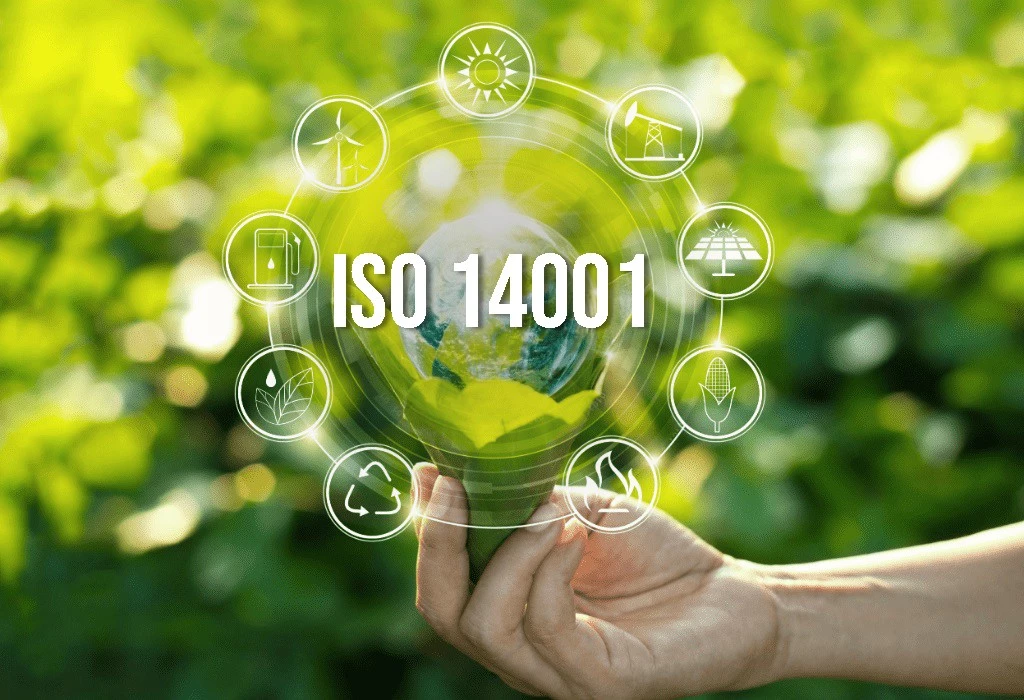ISO 14001:2015 Certification - Environmental Management System (EMS) | Accredify Global

Evolution of ISO 14001 Certification
ISO 14001 Certification, part of the ISO 14000 family, was first published in 1996 and has undergone multiple revisions, with the latest version being ISO 14001:2015. This international standard provides a framework for organizations to establish an effective Environmental Management System (EMS) that enhances sustainability, reduces environmental impact, and ensures regulatory compliance.
What is ISO 14001:2015 - Environmental Management System (EMS)?
ISO 14001:2015 sets out the criteria for an Environmental Management System (EMS), helping businesses identify, manage, monitor, and improve environmental performance. It applies to organizations of all sizes and industries, focusing on reducing waste, conserving resources, and ensuring compliance with environmental regulations.
Importance of ISO 14001:2015 Certification
- Regulatory Compliance: Helps meet legal and regulatory requirements, reducing fines and penalties.
- Cost Savings: Businesses implementing ISO 14001 can reduce waste by 20-30%, lowering operational costs.
- Competitive Advantage: 80% of companies with EMS certification report improved brand image and stakeholder trust.
- Risk Management: Identifies and mitigates environmental risks, preventing potential hazards.
- Increased Business Opportunities: 75% of large corporations prefer suppliers with ISO 14001 certification.
ISO 14001:2015 Environmental Management and Its Major Aspects in Business
A robust Environmental Management System (EMS) based on ISO 14001 covers:
- Waste Reduction: Optimizing resource use to decrease waste production.
- Energy Efficiency: Implementing energy-saving initiatives to reduce carbon footprint.
- Sustainable Practices: Enhancing sustainability through responsible sourcing and production.
- Stakeholder Engagement: Strengthening relationships with regulatory bodies, customers, and investors.
- Risk-Based Thinking: Proactively identifying and addressing environmental risks.
The Principles of ISO 14001 Certification
ISO 14001 certification is built on key environmental management principles:
- Environmental Policy – Commitment to sustainability and environmental performance.
- Planning – Identifying environmental aspects, legal requirements, and setting objectives.
- Implementation & Operation – Assigning responsibilities, training employees, and controlling environmental processes.
- Monitoring & Measurement – Tracking environmental performance and conducting audits.
- Continual Improvement – Regularly updating EMS to enhance efficiency and compliance.
Checklist for ISO 14001:2015 Certification
- Conduct an Environmental Impact Assessment.
- Establish an Environmental Policy and Objectives.
- Identify Legal and Regulatory Requirements.
- Implement Environmental Procedures and Training.
- Conduct Internal Audits and Management Reviews.
- Engage an Accredited Certification Body for auditing.
- Obtain ISO 14001 Certification upon successful compliance.
Is ISO 14001 Certification Mandatory or a Legal Requirement?
ISO 14001 certification is not mandatory, but it is highly recommended for organizations aiming to improve environmental performance. In industries with strict environmental regulations, compliance with ISO 14001 can be a competitive advantage and a legal safeguard.
Services
Benefits of ISO 14001 Certification
- Reduces Environmental Risks: Lowers pollution levels and enhances sustainability efforts.
- Operational Cost Reduction: Companies save 10-20% on energy consumption and waste disposal.
- Enhanced Reputation: 60% of consumers prefer environmentally responsible brands.
- Increases Market Access: Facilitates entry into markets requiring sustainability compliance.
- Boosts Employee Engagement: Employees feel more connected to sustainable company initiatives.
Requirements of ISO 14001 Certification
Organizations must demonstrate:
- A clearly defined EMS policyefforts.
- Compliance with environmental laws.
- Procedures for continuous improvement.
- Stakeholder engagement strategies.
- Effective internal audits and corrective actions.
Cost of ISO 14001 Certification
The cost of certification varies based on:
- Organization size and complexity.
- Industry sector and regulatory requirements.
- Scope of the environmental management system.
- Certification body and audit fees.
- Effective internal audits and corrective actions.
Businesses can expect an ROI within 1-2 years through reduced waste, lower energy costs, and improved operational efficiency.
PDCA Cycle | Accredify Global
- Plan – to think that what do we need to achieve in our organization
- Do – to execute a planned action which will help us achieve the required objective
- Check – monitor against the standards) (policies, objectives, requirements)
- Action – finally implementing what has been rechecked.
ISO CERTIFICATION. 3 STEPS. 30 DAYS. DONE !! | ACCREDIFY GLOBAL
Accredify Global, we follow a structured and transparent ISO certification process to help businesses achieve international compliance efficiently. Our streamlined approach ensures a hassle-free experience from initial consultation to final certification..
3. Audit Review & Certification
- Objective: Validate your management system through an external audit and achieve certification.
- Actions:
- Conduct an internal audit to ensure readiness for the certification audit, utilizing Accredify Global's auditing tools and resources.
- Schedule and undergo an external audit with Accredify Global's accredited certification body.
- Address any non-conformities identified during the audit with support from Accredify Global's consultants.
- Outcome: Successful certification and ongoing compliance with the ISO standard, with continuous support and guidance from Accredify Global.
Frequently Asked Questions (FAQs) about ISO 14001:2015 Certification - Environmental Management Systems (EMS)
Question : What is ISO 14001:2015 certification?
Answer: ISO 14001:2015 is an internationally recognized standard for Environmental Management Systems (EMS). It provides a framework for organizations to reduce their environmental impact, ensure regulatory compliance, and improve sustainability practices.
Question : Why is ISO 14001:2015 certification important?
Answer: ISO 14001 certification helps businesses: > Enhance environmental performance and reduce waste. > Improve compliance with environmental laws, avoiding fines and penalties. > Gain a competitive edge and increase business opportunities. > Lower operational costs by reducing energy and resource consumption.
Question : Who can apply for ISO 14001 certification?
Answer : Any organization, regardless of size or industry, can apply for ISO 14001 certification. It is suitable for manufacturing, service industries, construction, healthcare, education, and government organizations.
Question : What are the key requirements of ISO 14001:2015?
Answer: To achieve certification, organizations must: > Develop an Environmental Policy aligned with their objectives. > Identify and assess environmental risks and impacts. > Ensure legal and regulatory compliance. > Implement waste management and resource efficiency programs. > Continuously improve environmental performance using the PDCA (Plan-Do-Check-Act) cycle.
Question : Is ISO 14001 certification mandatory?
Answer: No, ISO 14001 certification is not legally required, but many businesses pursue it to demonstrate environmental responsibility, comply with regulations, and improve their reputation. Some industries or clients may require certification as a condition for doing business.
Question : How long does it take to get ISO 14001 certified?
Answer: The certification process typically takes 30-90 days, depending on: > The organization's size and complexity. > Existing environmental policies and procedures. > Readiness for the certification audit.
Question : How much does ISO 14001 certification cost?
Answer: The cost varies based on factors such as: > The size and nature of the organization. > The scope of the Environmental Management System. > Audit and certification body fees. Accredify Global offers cost-effective certification solutions with up to 25% savings compared to other providers.
Question : What are the benefits of ISO 14001:2015 certification?
Answer: > 20-30% reduction in energy consumption and waste disposal costs. > Improved compliance with local and international regulations. > 60% of consumers prefer companies with sustainable practices. > Increased employee awareness and engagement in environmental sustainability.
